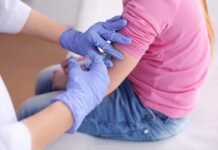
The CDC’s Advisory Committee on Immunization Practices is now recommending all adults ages 19 to 59 get vaccinated against hepatitis B. The recommendation is a change from previous guidance that said only those at risk should get the HBV vaccine.
According to the Centers for Disease Control and Prevention, there are almost two million people estimated to be living with hepatitis B in the United States. Almost a quarter of those will be at risk of premature death from liver disease or liver cancer due to long-term, chronic infection.
HBV is a vaccine-preventable liver infection caused by the hepatitis B virus. It is spread through bodily fluids from an infected person. Spread may occur through sexual contact, needle sharing, syringes, or mother to baby at birth. Common symptoms include fatigue, poor appetite, stomach pain, nausea, and jaundice.
In 2005, it was recommended that all newborns should receive their first HBV vaccine dose before hospital discharge, resulting in large decreases in new cases among children and adolescents.
In adults, rates of acute infections are now highest among 30-59-year olds, and rates have increased among older and middle-aged adults. This proves that the current risk-based screening process for adults is not working efficiently to reduce the number of new infections, public health officials say.
The HBV vaccine can either be given as a 2-dose vaccine series administered over a 1-month period, or a 3-dose vaccine series administered over a 6-month period. It is available at all District 2 Public Health departments.
District Two includes 13 counties in the northern part of the state including Banks, Dawson, Forsyth, Franklin, Habersham, Hall, Hart, Lumpkin, Rabun, Stephens, Towns, Union, and White.
For more information on hepatitis B visit the CDC website.








